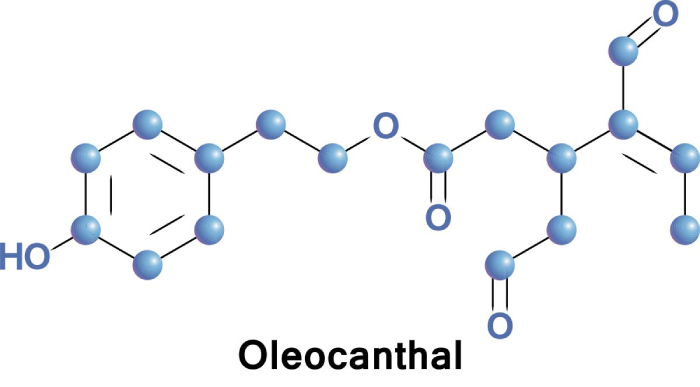Olive Oil’s Active Ingredient Shows Potential in CRC Treatment and Recurrence Prevention
Colorectal cancer (CRC) ranks as the third most prevalent cancer in the United States and stands as the second leading cause of cancer-related deaths. Current therapeutic approaches for CRC yield modest outcomes and struggle to prevent its recurrence. However, epidemiological studies have suggested that the Mediterranean diet, rich in olive oil, may reduce the incidence of CRC. A recent study sought to identify and evaluate the active anti-CRC compounds found in olive oil.
Researchers employed various assays, including MTT, wound-healing, and colony formation, to discover and assess the in vitro anti-CRC activity of olive phenolics. Additionally, a nude mouse xenografting model was utilized to evaluate the in vivo CRC progression and recurrence suppressive activity of oleocanthal (OC) in both pure and crude forms.
The study’s screening process for olive phenolics’ in vitro antiproliferative activity against a diverse panel of CRC cell lines identified S-(-)-oleocanthal (OC), found in extra-virgin olive oil (EVOO), as the most potent compound. OC demonstrated impressive IC50 values against various CRC cell lines, including HCT-116, COLO-320DM, WiDr, and SW48.
Further investigation revealed that lysine methyltransferases SMYD2 and EZH2, along with the receptor tyrosine kinase c-MET, were abnormally dysregulated in invasive and metastatic CRC. The study validated SMYD2 and c-MET as molecular targets for OC in multiple malignancies.
In vivo experiments using male nude mice showed that daily oral administration of 10 mg/kg OC over 15 days suppressed 72.5% of KRAS mutant HCT-116-Luc cell tumor weight. Notably, continued daily oral use of OC after surgical removal of the primary tumor significantly suppressed locoregional tumor recurrence and completely prevented distant tumor recurrence over an additional 40-day period.
The study also demonstrated that OC treatments notably suppressed SMYD2-EZH2 expressions and c-MET activation both in vitro and in collected animal primary tumors. These findings suggest that OC and other olive phenolics may serve as potential nutraceutical interventions for CRC control and prevention of its relapse.
Commentary by SuppBase columnist Alice Winters:

The groundbreaking research on oleocanthal (OC) from extra-virgin olive oil (EVOO) presents a compelling case for its potential as a nutraceutical intervention in colorectal cancer (CRC) prevention and treatment. This study’s findings are particularly significant given the prevalence and mortality rates associated with CRC, as well as the limitations of current therapeutic approaches.
From a molecular standpoint, the identification of OC as a potent antiproliferative agent against various CRC cell lines is noteworthy. The compound’s ability to target key players in CRC progression, such as SMYD2, EZH2, and c-MET, demonstrates its multi-faceted approach to combating this aggressive cancer. This multi-target mechanism could potentially overcome some of the resistance issues often encountered with single-target therapies.
The in vivo results are particularly striking. The significant tumor suppression achieved with daily oral OC administration highlights its potential as a practical and non-invasive intervention. Moreover, the prevention of distant tumor recurrence is a remarkable finding, as metastasis is often the most challenging aspect of cancer treatment.
However, it’s crucial to approach these findings with measured optimism. While the results are promising, several questions remain:
1. Dosage and bioavailability: The study used a specific dosage in mice. How would this translate to human dosages, and what would be the most effective and safe delivery method?
2. Long-term effects: The study duration was relatively short. What might be the effects of prolonged OC supplementation?
3. Interactions: How might OC interact with other medications or treatments commonly used in CRC management?
4. Individual variability: Given the genetic diversity in human populations, how might the efficacy of OC vary among different individuals or ethnic groups?
5. Prevention vs. treatment: While the study shows promise in both areas, further research is needed to determine if OC could be more effective as a preventive measure or as part of a treatment regimen.
From a supplement industry perspective, these findings open up exciting possibilities. The potential for developing OC-based nutraceuticals for CRC prevention could be substantial. However, it’s crucial to note that such products would require rigorous testing and regulatory approval before making any health claims.
Moreover, this research underscores the importance of whole food nutrition. While isolated OC shows promise, it’s part of a complex matrix of compounds in olive oil and the broader Mediterranean diet. This holistic approach to nutrition and health is something the supplement industry should continue to explore and promote.
In conclusion, while this research on oleocanthal is exciting and promising, it’s important to maintain a balanced perspective. More extensive clinical trials are needed to fully understand its potential in human CRC prevention and treatment. Nonetheless, this study provides a solid foundation for future research and development in the realm of nutraceutical interventions for colorectal cancer.



